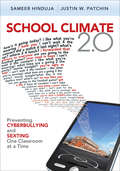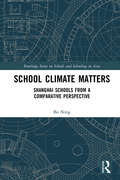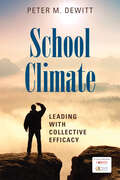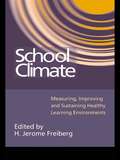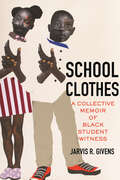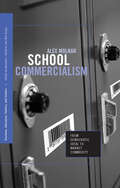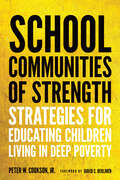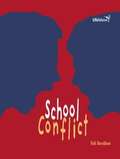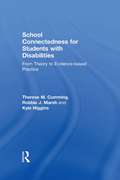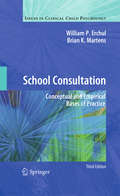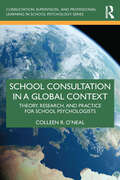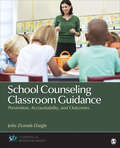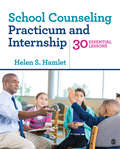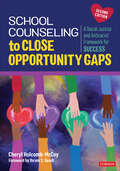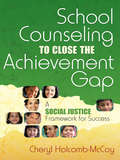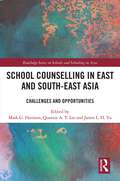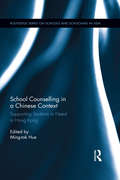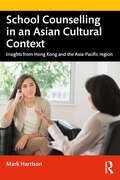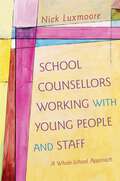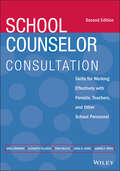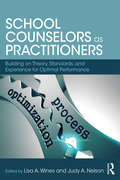- Table View
- List View
School Climate 2.0: Preventing Cyberbullying and Sexting One Classroom at a Time
by Sameer K. Hinduja Justin W. PatchinEmpower students and staff to prevent cyberbullying and sexting When students receive hurtful, threatening, or sexually explicit electronic messages, it affects their ability to concentrate on schoolwork. Renowned cyberbullying experts Sameer Hinduja and Justin W. Patchin connect the off-campus, high-tech behaviors of teens to the school environment and provide educators with a road map for developing a positive school climate that counteracts cyberbullying and sexting. Specific strategies include: Building a sense of community Peer mentoring Social norming Data-driven action plans Youth grassroots campaigns Multi-pronged policy and programming approaches by adults Included are real-life stories that help illustrate the research and a companion website with everything you need to bully-proof your school.
School Climate Matters: Shanghai Schools from a Comparative Perspective (Routledge Series on Schools and Schooling in Asia)
by Ning BoThis book describes the effect of school climate on student academic achievement. The unexpected leading position of Shanghai in its first and second appearance of the PISA survey—topping every league table in this assessment by a clear margin—attracted attention from all over the world. This book focuses on the relationship between student academic achievement and the characteristics of students and schools in Shanghai, while showing the effects of these factors within this specific educational ecology. Bo Ning considers the relationship between school climate and student academic achievement using data from PISA 2009 and 2012, with a focus on reading and mathematics. School climate is confined to the quality and characteristics of school life in relationships, and teaching and learning issues from a student perspective. In each chapter, one or several of the following five school climate variables are explored: school appreciation, teacher-student relations, disciplinary climate, reading atmosphere, and supportive climate. In addition to the focus on school climate, three basic concerns run through the whole book: the Shanghai educational context, the comparative approach, and causal inference. This book will be of great interest to academics, researchers, and postgraduate students in the fields of international and comparative education.
School Climate: Leading With Collective Efficacy
by Peter M. DeWittBuild a positive school climate to impact students, teachers, and the community! Is improving school climate on your to-do list? Do you think about it as a top-down directive or as a dialogue to build equity within the school? A healthy school environment should never be seen as an option, but instead supported as a must-have. Peter DeWitt offers leaders practical high impact strategies to improve school climate, deepen involvement in student learning, and engage a broader family network. In addition to international vignettes focused on community stakeholders and research-based practices, this book features tools such as: • A leadership growth cycle to help leaders build their self-efficacy • A teacher observation cycle centered on building collective efficacy • An early warning system to identify potential at-risk students • Action steps following each chapter to apply to your own setting • Discussion questions for use in team environments Establishing a supportive and inclusive school climate where professionals can take risks to improve the lives of students is vital to maximize learning in any school community. "This is a fabulous book by a renowned expert in the field of leadership. Peter DeWitt explains the complex and credible in a way that is thought-provoking, challenging and inspiring. I love how he gives insights in what successful collaborative leadership is and shows how we can all build our skills and mindset for leading towards collective efficacy." —James Nottingham, Challenging Learning author and creator of #TheLearningPit JN Partnership LTD, Northumberland, United Kingdom
School Climate: Leading With Collective Efficacy
by Peter M. DeWittBuild a positive school climate to impact students, teachers, and the community! Is improving school climate on your to-do list? Do you think about it as a top-down directive or as a dialogue to build equity within the school? A healthy school environment should never be seen as an option, but instead supported as a must-have. Peter DeWitt offers leaders practical high impact strategies to improve school climate, deepen involvement in student learning, and engage a broader family network. In addition to international vignettes focused on community stakeholders and research-based practices, this book features tools such as: • A leadership growth cycle to help leaders build their self-efficacy • A teacher observation cycle centered on building collective efficacy • An early warning system to identify potential at-risk students • Action steps following each chapter to apply to your own setting • Discussion questions for use in team environments Establishing a supportive and inclusive school climate where professionals can take risks to improve the lives of students is vital to maximize learning in any school community. "This is a fabulous book by a renowned expert in the field of leadership. Peter DeWitt explains the complex and credible in a way that is thought-provoking, challenging and inspiring. I love how he gives insights in what successful collaborative leadership is and shows how we can all build our skills and mindset for leading towards collective efficacy." —James Nottingham, Challenging Learning author and creator of #TheLearningPit JN Partnership LTD, Northumberland, United Kingdom
School Climate: Measuring, Improving and Sustaining Healthy Learning Environments
by H. Jerome FreibergLike a strong foundation in a house, the climate of a school is the foundation that supports the structures of teaching and learning. This book provides a framework for educators to look at school and classroom climates using both informal and formal measures. Each chapter focuses on a different aspect of climate and details techniques which may be used by heads or classroom teachers to judge the health of their learning environment. The book sets out to enhance understanding of the components of a healthy learning environment and the tools needed to improve that environment. It also looks at ways to assess the impact of change activities in improving and sustaining educational excellence. The international team of contributors bring perspectives from the school systems in America, UK, Australia and Holland.
School Clothes: A Collective Memoir of Black Student Witness
by Jarvis R. GivensA chorus of Black student voices that renders a new story of US education—one where racial barriers and violence are confronted by freedom dreaming and resistanceBlack students were forced to live and learn on the Black side of the color line for centuries, through the time of slavery, Emancipation, and the Jim Crow era. And for just as long—even through to today—Black students have been seen as a problem and a seemingly troubled population in America&’s public imagination.Through over one hundred firsthand accounts from the nineteenth and twentieth centuries, Professor Jarvis Givens offers a powerful counter-narrative in School Clothes to challenge such dated and prejudiced storylines. He details the educational lives of writers such as Zora Neale Hurston and Ralph Ellison; political leaders like Mary McLeod Bethune, Malcolm X, and Angela Davis; and Black students whose names are largely unknown but who left their marks nonetheless. Givens blends this multitude of individual voices into a single narrative, a collective memoir, to reveal a through line shared across time and circumstance: a story of African American youth learning to battle the violent condemnation of Black life and imposed miseducation meant to quell their resistance.School Clothes elevates a legacy in which Black students are more than the sum of their suffering. By peeling back the layers of history, Givens unveils in high relief a distinct student body: Black learners shaped not only by their shared vulnerability but also their triumphs, fortitude, and collective strivings.
School Commercialism: From Democratic Ideal to Market Commodity (Positions: Education, Politics, and Culture)
by Alex MolnarPizza Hut's Book It! program rewards students with pizza for meeting their reading goals. Toys R Us paid a Kansas school five dollars for each student who took its toy survey. Cisco Systems donated internet access to a California elementary school, asking in return for the school choir to sing the company's praises while wearing Cisco t-shirts.Kids today face a barrage of corporate messages in the classroom. In School Commercialism, education expert Alex Molnar traces marketing in American schools over the last twenty-five years, raising serious questions about the role of private corporations in public education. Since the 1990s, Molnar argues, commercial activities have shaped the structure of the school day, influenced the curriculum, and determined whether children have access to computers and other technologies. He argues convincingly against advertisers' assertion that their contributions are a win-win proposition for cash-strapped schools and image-conscious companies.From the marketing of unhealthy foods to privatizing reforms such as the Edison Schools and Knowledge Universe, School Commercialism tracks trends that are more pervasive than many parents realize and shows how we might recapture schools to better serve the public interest.
School Communities of Strength: Strategies for Educating Children Living in Deep Poverty
by Peter W. Cookson Jr.An evidence-based plan of action to achieve educational justice for K–12 public school students from families whose income is 50% or more below the US poverty threshold
School Conflict
by Tish DavidsonEvery day, thousands of students are pushed, shoved, taunted, and excluded at school. In extreme cases, these conflicts can lead to more violent behavior, such as school shootings. School Conflict examines the issues surrounding this timely topic, including factors that contribute to the making of a school shooter and society's role in school violence. You'll also find out about current efforts to reduce violence and how each of us can take action to make our schools a safe place.
School Connectedness for Students with Disabilities: From Theory to Evidence-based Practice
by Kyle Higgins Therese M. Cumming Robbie J. MarshSchool Connectedness for Students with Disabilities: From Theory to Evidence-based Practice focuses on the importance of school connectedness for students with disabilities, and presents ways in which this sense of connectedness can be fostered. Written from a holistic perspective, it embraces a variety of approaches, strategies and interventions rooted in evidence-based theory and practice, and examines them not only in regard to the student with a disability, but also school leaders, teachers, families and community members. The book describes and defines the concept of school connectedness, provides the reader with a theoretical framework from which to examine connectedness and explores connectedness from the lens of each of its components. It discusses the importance of assessing school connectedness in order to make data-based intervention decisions, as well as unpacking the components of student engagement, school climate, bonding and attachment. Several school-wide and leadership approaches that foster school connectedness are presented, as are ways to involve families. All of these are discussed through the lens of disability, in order to acknowledge the characteristics of disability that affect student levels of school connectedness.School connectedness has become a priority for many schools and educators internationally. Research demonstrates the importance of connectedness as a protective factor, and its impact on the health behaviour, social, emotional and academic outcomes of young people. Grounded in theory and relevant to practice, this is essential reading for anyone interested in improving the school connectedness of students with different disabilities across the lifespan.
School Consultation
by Brian K. Martens William P. ErchulSince its emergence during the 1960s, school consultation has become an important vehicle for delivering psychological and educational services. Cooperative efforts between skilled consultants and teachers, rooted in the principles of problem solving, social influence, and professional development, enhance student learning and adjustment while encouraging consultees to be more effective and proactive in their practice. The Third Edition of School Consultation: Conceptual and Empirical Bases of Practice shows in expert detail how this relationship works by synthesizing mental health and behavioral models of consultation with the most effective evidence-based practices (e.g., implementation support, response to intervention) informing the field today. The authors provide real-world contexts for all participants in the equation--consultants, teachers, students, staff, and the school itself--and thoroughly review consultation processes and outcomes for a contemporary practice-oriented approach suited to the new consultant, trainee, or researcher. Key features of the Third Edition include: An integrated mental health/behavioral model for school consultation.An organizational study of the school as a setting for consultation.Assessment issues and strategies particularly relevant to school consultation.Approaches to providing teachers with implementation support. Conceptual models for selecting academic and behavioral interventions.Administrative perspectives on school consultation.A real, transcribed case study analyzed by the authors.In the tradition of its predecessors, School Consultation, Third Edition, is a confidence-building tool for practitioners in school psychology, clinical child psychology, educational specialties, school counseling, special education, and school social work as well as a trusted reference for researchers in these fields.
School Consultation in a Global Context: Theory, Research, and Practice for School Psychologists (Consultation, Supervision, and Professional Learning in School Psychology Series)
by Colleen R. O'NealSchool Consultation in a Global Context provides theoretical foundations, empirical research, lessons learned, and implications for practice in school consultation across distinct cultures and national borders. School psychologists have new opportunities to leverage existing and innovative frameworks, research methods, and advocacy supports to provide effective service for culturally diverse populations globally, including refugees. Driven by liberatory, participant-centered interventions and research designs, this book is an essential resource for building long-term global school consultation partnerships and reaching successful outcomes. School psychology researchers and practitioners will be well-prepared by this collaborative approach to global school consultation partnership development, training, intervention implementation and evaluation, tele-consultation, grant funding, theories, formative and effectiveness research, and more across international contexts.
School Counseling Classroom Guidance: Prevention, Accountability, and Outcomes (Counseling and Professional Identity)
by Jolie Ziomek-Daigle"Finally, a text that thoroughly covers the topic of classroom guidance – an effective tool for every school counselor at every school level." –Tiffany Bates, Louisiana Tech University Intended for school counselors to aid in the learning of developmental classroom guidance, School Counseling Classroom Guidance: Prevention, Accountability, and Outcomes teaches the fundamentals, strategies, and research outcomes of classroom guidance programming for comprehensive, developmentally appropriate school counseling programs. The content of this book looks at the history and fundamentals of classroom guidance, how these activities meet CACREP and ASCA standards, how and why activities should be aligned to the larger academic curriculum and state/national teaching standards, recommendations on how to develop and assess classroom guidance units, a sampling of units and lessons, techniques in managing the classroom, and outcome research and trends. School Counseling Classroom Guidance: Prevention, Accountability, and Outcomes is part of the Counseling and Professional Identity Series, which targets specific competencies identified by CACREP (Council for Accreditation of Counseling and Related Programs).
School Counseling Classroom Guidance: Prevention, Accountability, and Outcomes (Counseling and Professional Identity)
by Jolie Ziomek-Daigle"Finally, a text that thoroughly covers the topic of classroom guidance – an effective tool for every school counselor at every school level." –Tiffany Bates, Louisiana Tech University Intended for school counselors to aid in the learning of developmental classroom guidance, School Counseling Classroom Guidance: Prevention, Accountability, and Outcomes teaches the fundamentals, strategies, and research outcomes of classroom guidance programming for comprehensive, developmentally appropriate school counseling programs. The content of this book looks at the history and fundamentals of classroom guidance, how these activities meet CACREP and ASCA standards, how and why activities should be aligned to the larger academic curriculum and state/national teaching standards, recommendations on how to develop and assess classroom guidance units, a sampling of units and lessons, techniques in managing the classroom, and outcome research and trends. School Counseling Classroom Guidance: Prevention, Accountability, and Outcomes is part of the Counseling and Professional Identity Series, which targets specific competencies identified by CACREP (Council for Accreditation of Counseling and Related Programs).
School Counseling Practicum and Internship: 30 Essential Lessons
by Dr Helen HamletSchool Counseling Practicum and Internship: 30 Essential Lessons combines crucial counselor knowledge with the experience of experts in the field into one practical guide for addressing the real world of school counseling. Drawing on more than a decade of teaching, author Helen S. Hamlet, PhD presents a collection of lessons and techniques that includes forms, websites, activities, and current information focusing on a range of challenging issues. This unique text is a resource that practicum and internship students, counselor educators, and practicing school counselors will keep and refer to for years to come.
School Counseling Practicum and Internship: 30 Essential Lessons
by Dr Helen HamletSchool Counseling Practicum and Internship: 30 Essential Lessons combines crucial counselor knowledge with the experience of experts in the field into one practical guide for addressing the real world of school counseling. Drawing on more than a decade of teaching, author Helen S. Hamlet, PhD presents a collection of lessons and techniques that includes forms, websites, activities, and current information focusing on a range of challenging issues. This unique text is a resource that practicum and internship students, counselor educators, and practicing school counselors will keep and refer to for years to come.
School Counseling to Close Opportunity Gaps: A Social Justice and Antiracist Framework for Success
by C.heryl C. Holcomb-McCoyCreate conditions that lead to success for ALL students and confront conditions that create opportunity gaps School counselors can play a powerful role in closing opportunity gaps and addressing the social, emotional, and academic needs of students. This new edition of a groundbreaking bestseller shows school counselors how to incorporate principles of social justice, antiracism, equity, and advocacy into their practice. Written by Cheryl Holcomb-McCoy, university professor and advocate of transformational change in school counseling, this book addresses the reasons why some students are more likely to encounter challenges at school due to racism, sexism, heterosexism, and classism. It includes: Vignettes, strategies, activities, and reflective individual and group study questions A framework for how school counselors can mitigate the impact of negative factors that hamper academic performance and healthy development, especially among students of color Six functions of school counselors that move schools toward more just practices and, ultimately, to higher test scores and increased student achievement Written for both preservice and in-service school counselors and those who support them, this essential guide prepares readers to take an active role in creating equitable conditions for success for all students.
School Counseling to Close Opportunity Gaps: A Social Justice and Antiracist Framework for Success
by C.heryl C. Holcomb-McCoyCreate conditions that lead to success for ALL students and confront conditions that create opportunity gaps School counselors can play a powerful role in closing opportunity gaps and addressing the social, emotional, and academic needs of students. This new edition of a groundbreaking bestseller shows school counselors how to incorporate principles of social justice, antiracism, equity, and advocacy into their practice. Written by Cheryl Holcomb-McCoy, university professor and advocate of transformational change in school counseling, this book addresses the reasons why some students are more likely to encounter challenges at school due to racism, sexism, heterosexism, and classism. It includes: Vignettes, strategies, activities, and reflective individual and group study questions A framework for how school counselors can mitigate the impact of negative factors that hamper academic performance and healthy development, especially among students of color Six functions of school counselors that move schools toward more just practices and, ultimately, to higher test scores and increased student achievement Written for both preservice and in-service school counselors and those who support them, this essential guide prepares readers to take an active role in creating equitable conditions for success for all students.
School Counseling to Close the Achievement Gap: A Social Justice Framework for Success
by Dr C. Heryl C. Holcomb-MccoyBe a major player in improving student development and performance! Rooted in the principles of social justice, this much-needed resource offers school counselors a road map for promoting equity and increasing student achievement. The author shows counselors how they can improve both the delivery and impact of their counseling, consulting, and coordination services by incorporating data and advocacy into their everyday work. To assist them in challenging bias and creating conditions that promote success for all students, this book offers readers: Counseling snapshots of challenging situations Small-group activities for students Suggested readings for extending learning Individual and group reflective questions to deepen understanding
School Counselling in East and South-East Asia: Challenges and Opportunities (Routledge Series on Schools and Schooling in Asia)
by Mark G. Harrison Lee, Queenie A. Y. Yu, James L. H.This book explores trends in the practice of school counselling in East and Southeast Asia in response to socioeconomic changes, developments in education and schooling, the growth of technology, and the legacy of the recent COVID-19 pandemic.The volume adopts an ecological perspective, taking into account both schools’ institutional contexts and the sociocultural settings in which school counsellors work. Chapters focus on the needs, perspectives, and expectations of different stakeholders and explore the changing roles and identities of school counsellors. Contributions from Mainland China, Hong Kong SAR, Japan, Malaysia, The Philippines, Singapore, and Vietnam provide a wide-ranging account of the development of school counselling in the region and set out key themes and priorities for this fast-developing field.Academics in the field of school counselling, practising school counsellors, academics involved in training programmes for school counsellors and students will find this an invaluable volume. More broadly, this text will be of interest to individuals involved in accrediting bodies for international schools in Asia, and school leaders tasked with overseeing counselling provision and that of well-being.
School Counselling in a Chinese Context: Supporting Students in Need in Hong Kong (Routledge Series on Schools and Schooling in Asia)
by Ming-Tak HueSchool Counselling in a Chinese Context discusses research in school counselling in the Chinese context of Hong Kong schools and various educational settings, and provides a contextualized understanding of counselling issues. This book highlights key contextual conditions for counselling in Hong Kong – a Chinese society. The sub themes addressed in the book include school practices and teacher perspectives on guidance, counselling, behaviour support and school discipline; whole-school guidance program for identity construction; school counselling for ethnic minority students; contextual influence of the use of play therapy; school counselling for students with minority sexual orientation; Chinese cultural influence on counselling, etc. The book also develops new theoretical orientations to understanding various issues of counselling as arisen in the Chinese society of Hong Kong and helps school practitioners to develop culturally responsive approaches to school counselling for personal growth, spiritual and emotional education. The themes addressed in the book include: School practices and teacher perspectives on guidance, counselling, behavior support and school discipline School counselling for ethnic minority students Contextual and cultural influence of the use of play therapy School counselling for students with minority sexual orientation Chinese culture influence on parental participation in counselling School Counselling in a Chinese Context will be of interest to postgraduates and researchers in the field of Counselling, school psychology, child development and Chinese studies.
School Counselling in an Asian Cultural Context: Insights from Hong Kong and The Asia-Pacific region
by Mark HarrisonSchool Counselling in an Asian Cultural Context focuses on the ways in which cultural setting influences the practice of school counseling, its effectiveness, and the experience of young people as they engage in counseling in schools. The mental health of young people is increasingly a cause for concern, particularly in Asia’s high-pressured league-topping education systems, and the wellbeing of students is becoming more a part of the wider remit of schools. Mark Harrison presents a broad overview of the development and current practice of school counseling in Hong Kong in both local and international schools and examines this in relation to school counseling in US and UK settings as well as the wider Asia-Pacific region. The book brings together two foci: the practice of school counseling in the Asian cultural context of Hong Kong, and the effectiveness and experience of school counseling from the perspective of young people and counselors. The diversity of schools in Hong Kong makes it a microcosm of trends and practices in school counseling globally and, as such, offers insights which will be of interest to students in training; school counselors, administrators and policy makers in the Asia-Pacific region and further afield.
School Counsellors Working with Young People and Staff: A Whole-School Approach
by Nick LuxmooreWhat is it like to work as a counsellor in schools? What relationship might a counsellor have with staff? How can a counsellor become a positive, integral part of school life? In this book, Nick Luxmoore shows how school counsellors can make a positive difference to the whole life of the school. Rather than being a service hidden behind closed doors, he shows how to take a whole-school approach to counselling, making it a normal part of school life. The book demonstrates how staff as well as students can benefit from counselling, and how professional boundaries and relationships can be maintained. Key therapeutic aims and how to develop the service are also covered. Drawing on over 26 years' experience as a school counsellor, Luxmoore combines vivid case material with psychotherapeutic theory to show counsellors how to provide an excellent service and make a positive contribution to the school. The book will be essential reading for school counsellors, headteachers, teachers, and anyone interested in effective counselling in schools.
School Counselor Consultation: Skills for Working Effectively with Parents, Teachers, and Other School Personnel
by Greg Brigman Elizabeth Villares Fran Mullis Linda D. Webb JoAnna F. WhiteExplore a wide range of strategies and techniques to build your school counselor consulting skillsetIn the newly revised Second Edition of School Counselor Consultation: Skills for Working Effectively With Parents, Teachers, and Other School Personnel, a team of distinguished counselors delivers a comprehensive and insightful exploration of the consultation process. With a strong focus on proven, practical techniques, this book offers readers a detailed case consultation model, an interactive workshop model, concise discussions of trauma-informed practices, consultations supporting students with anxiety, and more. The book also includes: An emphasis on building the skills necessary for counselors to facilitate the personal, social, career, and academic growth of students. An integration of theory and practice using an experiential approach to developing consulting competence. Appendices and sample activities that outline the techniques and strategies used to support learning. Perfect for students pursuing master's degrees in Education, School Counselor Consultation is also ideal for school counselling students and practitioners seeking a hands-on framework for applying consulting theory and approaches to the school setting.
School Counselors as Practitioners: Building on Theory, Standards, and Experience for Optimal Performance
by Lisa A. Wines Judy A. NelsonDesigned for school counseling course work and as a reference for school district personnel, this text demystifies the roles and responsibilities of the school counselor and teaches students and practitioners how to perform, conduct, follow through, and carry out various roles and responsibilities required on the job. School Counselors as Practitioners conveys strategic, step-by-step processes and best practice recommendations, with emphasis on ethical and multicultural considerations. The 14 chapters in this textbook maintain, and are consistent with, the basis of school counselors’ work in the school counseling core curriculum, responsive services, individual planning, and system support, and special attention is paid to ASCA and CACREP standards. A companion website provides students with templates and handouts for on-the-job responsibilities, as well as quiz questions for every chapter.
